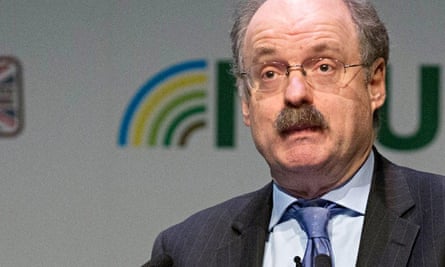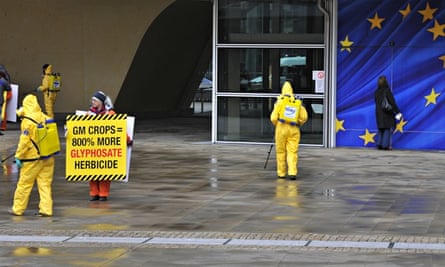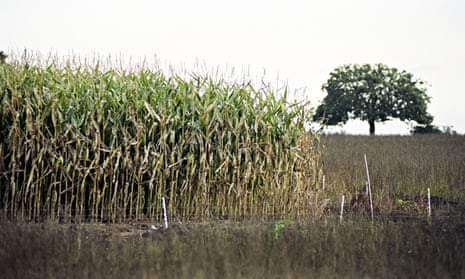The EU’s de facto ban on genetically modified (GM) crops may have caused more harm than good, according to the UK’s chief scientist.
Sir Mark Walport told MPs on the Science and Technology committee on Wednesday: “The consequence of inactions are that we are potentially, particularly in Europe, denying access to technologies that actually will potentially help feed people in ways that damage the environment less.”
He said food security in Europe, particularly in Britain, was more tenuous than people realised and the costs of controlling agricultural pests could be significantly reduced.
Only one GM crop is currently grown commercially in the European Union – the insect-resistant maize MON 810.
Gaining approval for the cultivation of GM crops in the EU has been effectively impossible because each one requires a vote by member states. Many EU countries are sceptical of the technology. So even if a crop is approved by the European Food Safety Authority (Efsa) it is unlikely to make it into commercial fields. New rules allowing member states to unilaterally ban GM may ease this political blockade.
Scientists, including Walport and the EU chief scientist Anne Glover whose role is being axed, say GM is not inherently dangerous, essentially no different to the selective breeding that humans have engaged in for millennia and each crop should be assessed on its own merits.
“It makes more sense to assess crops based on their individual characteristics and the farming practices that accompany them, rather than the method by which they were produced,” says Mark Downs, chief executive of the Society of Biology.

Walport told the committee that the UK’s advocacy for GM crops in the face of EU opposition was scientifically justified. “I do consider that to be an evidence-based policy indeed. The science is very clear and I’m happy that the government have taken on board the science.”
Wendy Harwood, a senior scientist at the John Innes Centre, said GM’s commercial stasis meant useful technologies were being ignored. “As scientists we see promising things coming along and there’s a frustration that these things will never actually benefit people because of the huge costs.”
A study published in the journal PLOS One this year found “on average, GM technology adoption has reduced chemical pesticide use by 37%, increased crop yields by 22%, and increased farmer profits by 68%”.
Jonathan Jones, a plant molecular biologist at the Sainsbury Laboratory, says the tales of missed opportunity are legion because the regulatory requirements for GM crops are “far in excess of what’s rational”. The cost of the process, hundreds of millions of pounds, means very few crops are worth the risk of bringing all the way through. This cost excludes the public sector from developing commercial crops, leaving the sector oligopolised by a handful of massive agro-corporations.
But in Europe, even these well-resourced companies are turning away from the technology. A strain of blight-resistant potatoes was removed from the approval process by agrochemical giant BASF after it became clear that even if it was found to be safe by Efsa, it was likely be voted down by EU politicians.
Jones says the GM potato could have saved millions. Blight costs UK potato farmers around £60m every year in losses and the massive use of chemical sprays. Each hectare has £500 worth of fungicide dumped on it each season.
Jones says there are similar stories for pest-resistant cabbages and broccoli as well as yellow-rust resistant wheat. “These are examples where in a rational world we’d be just getting on with [them].”
Joe Perry, chair of Efsa’s GMO Panel, disagrees with Jones’ assertion that the regulatory burden is too great. “He’s wrong. The risk assessment is quite rational and is not much different to any other regulatory authority.”
He says “the data requested are proportionate to the risk” and that each technology must be approached as novel and without assumption. “Just because we haven’t seen any problems in the past, doesn’t mean we are not going to see problems in the future.”
Efsa has not found any GM crops to pose a serious risk to human or animal health.
But Perry says the cultivation of GM crops does raise legitimate environmental concerns. For example, the cultivation of MON 810 maize, which produces a protein that harms the insects that eat it, could create a super pest strain with resistance to natural plant defences. But Perry says most of these concerns can be ameliorated by management, rather than a ban. For example, controlling how much MON 810 is planted in one area.
It is Efsa’s job to assess the danger posed by GM crops to humans and animals as well as the environment. The EU, under the precautionary principle, has an obligation to also assess the benefits and then make an informed decision weighing the two against each other. But Perry says the EU has neglected to define the benefits, skewing the bloc’s policy.
Walport joined Jones by suggesting the GM debate is a conflict between objective science and irrational belief. “We pretend that the debate about genetically modified crops is a debate about science when the reality is actually that the science is very clear. It is really a debate about values. About people [with] strongly held personal opinions and beliefs [who] believe that there is something wrong in humans modifying nature.”
Defining the GM debate as a contest between objective science and irrational belief allows scientists to ignore a wider definition of risk and to frame opponents as fundamentalists.

But Marco Contiero, Greenpeace’s EU policy director on agriculture says many of the scare tactics used against GM – for example the moniker “Frankenfoods” – are red herrings. He says GM technology is “absolutely brilliant” in highly controlled circumstances, but says there are serious, rational, empirical questions about the reality of GM cultivation in the wider environment. The benefits attributed to GM can only be seen as benefits if you accept a form of agriculture dominated by five monolithic corporations and vast fields of single crops with a massive ecological footprint, he says.
“GM crops can benefit, from an economic point of view, large scale farmers who enjoy economies of scale which allow them to recover the higher costs of GM seeds and the agro-chemicals that come with them in packages, for example Monsanto GM crops tolerant to herbicide RoundUp and Monsanto RoundUp herbicide.
“However, it is imperative to achieve a paradigm shift from such kind of farming, which damages the environment in many different ways at local (e.g. agrochemical pollution) as well as international level (fostering climate change due to its reliance on fossil fuels) towards farming systems based on agricultural diversity and biodiversity.”
The GM story conversation breaks down because of these differing frames of reference.
Opponents refuse to acknowledge the potential and proven benefits of crops that resist pests or drought or have higher concentrations of important nutrients. To do so would undermine their position on agricultural reform.
Scientists are caught uncomfortably between the potential of a technology that is inherently useful and the reality of an agricultural system dominated by corporations with a track record of environmental vandalism.
By defining the costs and benefits within certain parameters, Walport ignores vital questions about how we farm, who owns the means of production and who ultimately benefits.

Comments (…)
Sign in or create your Guardian account to join the discussion